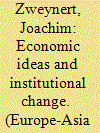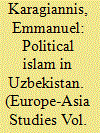| Srl | Item |
| 1 |
ID:
070174


|
|
|
|
|
| Publication |
2006.
|
| Summary/Abstract |
The article analyses the shift in ideas that took place in Soviet economic thought between 1987 and 1991 and its relation to the changes in the real economy. The main focus of the article is on the issue of whether the evolution of Soviet economic thought in the analysed period changed in a gradual, path-dependent manner, or in a discontinuous, revolutionary fashion. Following the approach of Imre Lakatos, I argue that the conviction of being on the road to the 'wholesome society' formed the hard core of Soviet ideology, while 'democratic centralism' and the centralised economy provided its protective belt. Perestroika was the last attempt to save the hard core of Soviet ideology by adjusting the protective belt. This attempt failed, and the economic debates, which at first had been restricted to the protective belt, more and more approached its hard core, until it finally cracked. In this sense there was certainly a paradigm shift in Soviet economic thought. However, the notion of history as a purposeful process was not given up even by the Soviet adherents of monetarism. The utopian liberalism which became fashionable among Russian economists for a short period of time, it is argued, provides evidence that paradigm shifts and path-dependence in the evolution of economic ideas are not mutually exclusive.
|
|
|
|
|
|
|
|
|
|
|
|
|
|
|
|
| 2 |
ID:
070177


|
|
|
|
|
| Publication |
2006.
|
| Summary/Abstract |
The favourable assessments of international organisations regarding the character of democracy in the Central European countries seem to suggest that, in spite of early fears, democracy can be established even in a low-trust environment. Through analysing the difficulties of fiscal adjustments in Hungary this article examines how lack of trust affects the quality of these democracies in terms of effective governance. Hungary used to be a front-runner in the transition process but given its ballooning budget deficit, it is now considered a laggard in terms of meeting the requirements for introducing the euro. This article claims that while strong continuities from the socialist period gave the country a head start at the beginning of the transition process, the same continuities have slowed down development more recently because of their effects on the general level of trust. The prevalence of distrust both towards and within the elite provides a fertile environment for economic populism and under such circumstances fiscal adjustment becomes more difficult. The main conclusion is that while the low level of trust did not prove decisive in terms of establishing the institutions of democracy, the existence of trust is critical for effective governance.
|
|
|
|
|
|
|
|
|
|
|
|
|
|
|
|
| 3 |
ID:
070175


|
|
|
|
|
| Publication |
2006.
|
| Summary/Abstract |
Many Russian civil society organisations are directly engaging with state law enforcement agencies, particularly the police, in joint efforts to improve the performance and change the norms and values of state officials involved in administering justice. These activities are based upon a model of state-society relations that stresses the possibility of a positive relationship of mutual assistance and partnership between the state and civil society. Such assistance is often described by these organisations as helping low-level bureaucrats better perform their core organisational tasks. This model is contrasted with two alternative models of the role of civil society, which depict civil society either as teaching citizens the norms and values associated with liberal democracy, or as a potential counter-weight to an over-reaching state. Three cases studies of cooperation between NGOs and law enforcement agencies demonstrate the utility of such an approach. Although these projects suffer from some common pathologies of civil society work in Russia, they remain important, not least because of the presence of 'uncivil society' extremist groups who also are trying to influence the norms and beliefs of state law enforcement officials. The civil society activities profiled here suggest that direct, cooperative engagement with the state is one important component of long-term efforts to transform the Russian state in a more liberal, 'civil' direction.
|
|
|
|
|
|
|
|
|
|
|
|
|
|
|
|
| 4 |
ID:
070178


|
|
|
| 5 |
ID:
070173


|
|
|
|
|
| Publication |
2006.
|
| Summary/Abstract |
This article links post-communist politics with regional development through an investigation of the formulation of strategic plans at various levels. This is an important activity for compliance with procedures essential to accessing EU financial support, and beyond that, it has significance for the investigation of political relationships. The dominant conclusion is that the communist period and the post-communist transformation left distinctive features that created barriers to the emergence of the 'standard' EU pattern and therefore justifies continued use of the 'post-communist' label. In particular, this is exhibited in a disjointed structure of regional and local administration with weak cooperation between levels. EU prescriptions and involvement have in some respects accentuated the isolation of levels from each other. This article argues that the standard interpretation of the concepts of social capital and partnership needs to be clarified. Above all, it becomes clear that there needs to be recognition and acceptance of the conflicting nature of many relationships and of the bargaining and compromises lying behind a regional strategy and its implementation. The article thereby adds to the literature that has warned against some over-enthusiastic interpretations of social capital and related concepts as providing an unambiguous basis for a region's development
|
|
|
|
|
|
|
|
|
|
|
|
|
|
|
|
| 6 |
ID:
070176


|
|
|
|
|
| Publication |
2006.
|
| Summary/Abstract |
Censorship intensified in Ukraine during Leonid Kuchma's second term as president, and analysts often use this as an indicator of the country's democratic backsliding. This article looks at the motivations behind the media muzzling and questions its effectiveness given that the country exploded in revolution in late 2004.
|
|
|
|
|
|
|
|
|
|
|
|
|
|
|
|